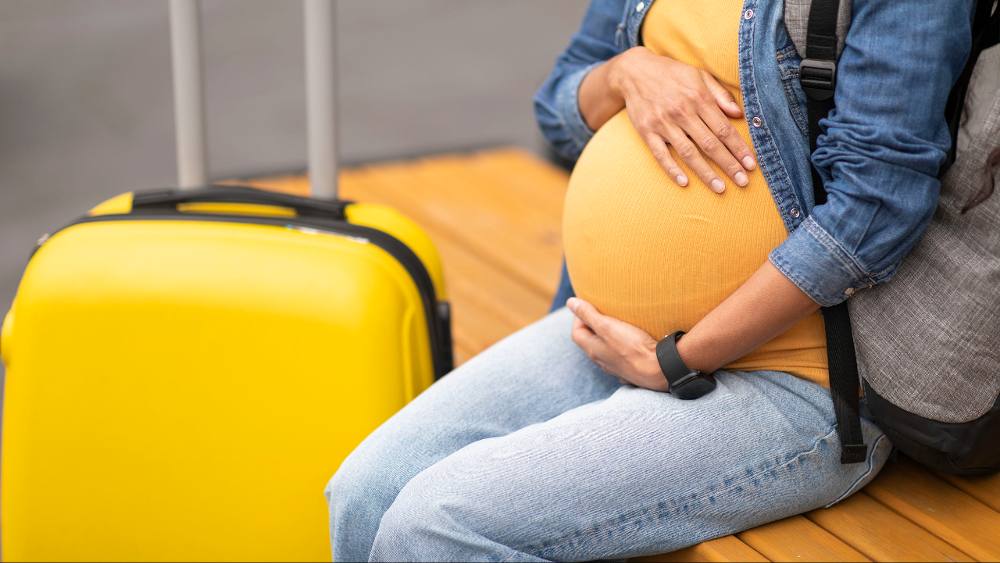Survival Guide: Traveling Overseas When You Are Pregnant
Whether you’re planning a babymoon, going on a business trip, or traveling to see family, going abroad while pregnant can require a fair amount of logistics, depending on which trimester you’re in.
I should know - I had to postpone a couple of short holidays during my first trimester due to my debilitating nausea, and I just returned from a two-week family trip to Taiwan, where I spent half the time Googling nearby pharmacies and whether or not I could eat certain types of seafood.
Now that I’m a little wiser, I’m ready to embark on a true babymoon before the start of my third trimester. If you’re pregnant, ready for jet-setting, and yet unsure where to start, keep reading:
Travel time
The biggest question you’re probably asking yourself right now is, “Where should I even go?”. Maybe you’re the type to consider far-flung locations since you’ll likely be ‘grounded’ for the next few months or years. Depending on where you are in your pregnancy, you might need to pack some compression socks for a long-haul flight. Definitely book an aisle seat for easy access to the toilet, since you’re probably peeing a lot more frequently now. And if you can afford it, consider upgrading your seat to something more spacious so you can stretch your legs and alleviate pressure on your back.
Or, if you’re like me and feel stressed out at the thought of taking a 12-hour flight while manoeuvring all the ups and downs of pregnancy, consider a closer location - I also factored in the time I’d have to stand at customs, so I chose a place where I could get in and out of immigration quickly.
Regardless of the length of your flight, make sure you pack these for the plane: An empty water bottle (it’s important to stay hydrated since your blood volume increases during pregnancy), a small first aid kit filled with extra medication and anti-nausea medicine, and a carry-on that isn’t too heavy for you to tote around the airport - I personally recommend a small roller bag. Bring a belly band or a small pillow if need extra back support as well.
 IMAGE: 123RF
IMAGE: 123RF
What’s there to eat?
Whether you’re battling food aversions or being mindful of dietary restrictions, you should prioritise a destination with a variety of things that you can actually eat. During my first trimester, anything with green onion, coriander, Asian spices, or sesame oil would trigger my gag reflex, so I obviously had to postpone my planned trips to Vietnam and Taiwan. I'll probably do the same should I get diagnosed with gestational diabetes, which comes a whole other dietary plan.
At the same time, don’t limit yourself too much if you're having a low-risk pregnancy. I have a friend to visited Japan for three weeks while pregnant, despite the “no sashimi rule”, but between all the tonkatsu, udon, and ramen, she had plenty to enjoy.
Planning activities: To hike, or not to hike…
You know your own body and endurance best. As someone who barely went to the gym before getting pregnant, let alone after, I was naive in agreeing to a 10km “simple hike” with my parents - if I were going with seniors, I reasoned, how hard could it be?
Turns out that traversing dirt stairs cut straight from the mountainside while carrying a few kilogrammes of extra weight in the front was too much for me to handle, and I gave up after 100 metres. Naturally, I also had to pee while on the mountain, which meant clinging onto thorny shrubs for balance while squatting behind a bush that was big enough to hide me and my ever-growing belly.
Suffice to say, I won’t be skiing in Hokkaido, queuing for hours in the sun at Disneyland, or climbing stairwell after stairwell in the Paris Métro until this pregnancy is over. But hey, if you’re fit enough to attend CrossFit classes or run half-marathons while pregnant, then go ahead and hike to your heart’s desire.
 IMAGE: 123RF
IMAGE: 123RF
Get clearance from your healthcare provider
Your Ob-Gyn will look into your symptoms, medical history, and where you are in your pregnancy before giving you the go-ahead. Doctors’ strictness varies, but many will bar you from traveling once you hit 36 years weeks, which is the tail end of your pregnancy. But some will advise you against traveling even after about 28 weeks, when you’re about to enter your third trimester.
If your pregnancy is low-risk, and especially if you haven’t reached your third trimester yet, they’ll likely say yes. But if you’ve been bleeding, have a previous miscarriage, or delivered a child prematurely, they’ll likely ask you for details about your planned itinerary. Don’t be surprised or disappointed if they recommend more stationary activities or shorter flights - they’re just trying to look out for you! (Who’d want to be in a plane over the Atlantic Ocean during an emergency? Not me!)
They might also recommend certain vaccinations depending on where you're traveling, so make sure you schedule a bit of down time to recover after taking them.
Ask your healthcare provider for a “fit to fly” letter
Some airlines are strict about letting pregnant women board, so to be safe, ask for a “fit to fly” letter signed by your doctor. If you have yet to confirm your travel dates, ask them to give you a range that covers the probable time that you’ll go abroad.
Request extra prescriptions to alleviate travel-related symptoms
As someone who always gets congested on the plane, I knew traveling would only get more uncomfortable when dealing with pregnancy rhinitis. My Ob-Gyn prescribed me a nasal spray to use on the plane, along with extra progesterone (hormone) pills, which are typically prescribed to help us maintain a healthy pregnancy. I also asked for plenty of anti-nausea medication since the pills I was taking are not available in Taiwan.
This is also a great time to ask for advice should you get sick abroad - for example, what’s the best way to manage diarrhoea when pregnant? Which medications are safe for flu symptoms? What should I do if I start bleeding?
Google hospitals and clinics near your accommodations
I feel like I’m preaching to the choir here, but this is important to know in case you give birth or experience serious complications while overseas. Bring a folder filled with your medical records in case you need it. Look into your travel insurance as well to see if it covers medical costs!
Above all, remember to listen to your gut. Babymoons might be popular, but they aren’t a necessity. And the people around you might tell you it’s fine to travel up to a certain point, but if you’d rather be safe, it’s okay to cancel that plane ticket or to talk to your boss about the necessity of business travel - after all, the best thing you can bring with you on an overseas trip is peace of mind.
For the latest updates on Wonderwall.sg, be sure to follow us on TikTok, Telegram, Instagram, and Facebook. If you have a story idea for us, email us at [email protected].











